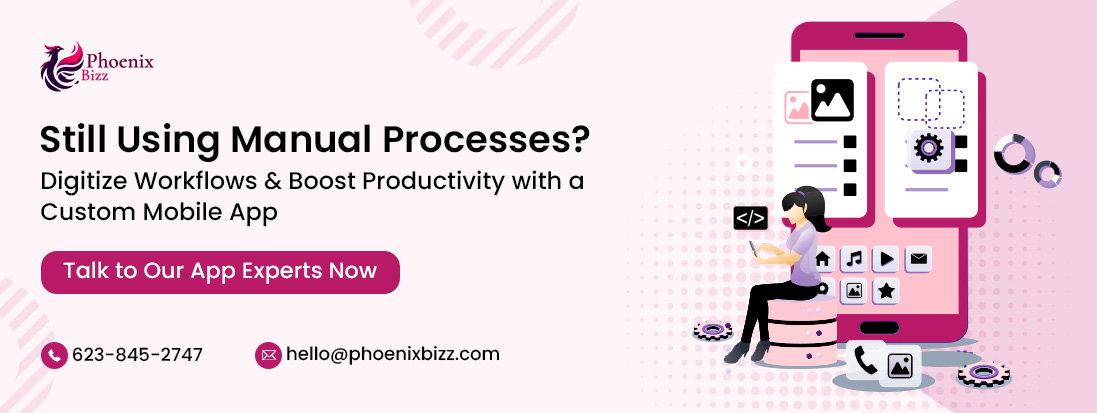April 10, 2025
By: PhoenixBizz Staff Writer
PhoenixBizz is a division of Sofvue, LLC
Printed with permission of Data Titan and Sofvue LLC
One dominant technology continues to shape our internet-driven world: mobile applications. From Gen-Z to Millennials, individuals across age groups increasingly rely on mobile apps to complete a wide range of daily tasks. Whether it’s shopping online or accessing e-learning tools, the convenience and accessibility of mobile apps make them a popular go-to solution.
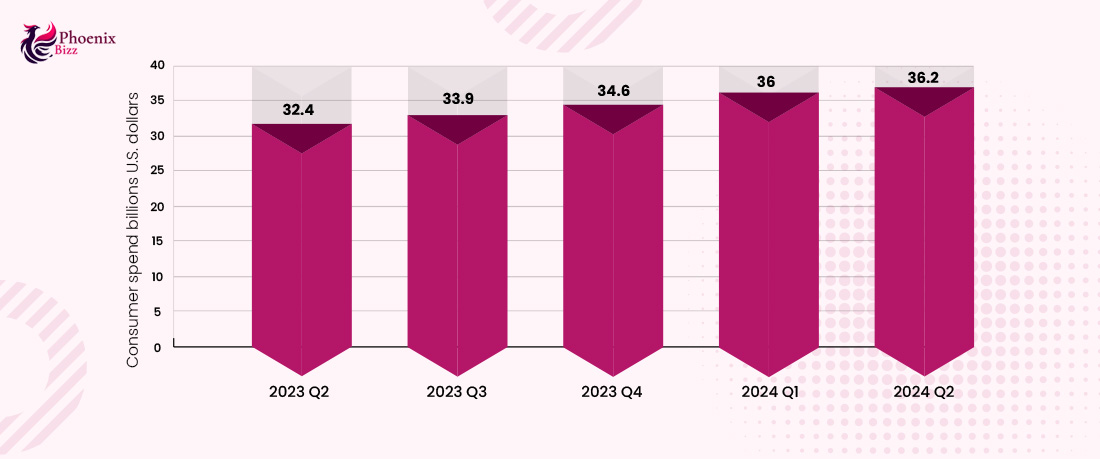
According to Statista, consumer spending on mobile apps rose to $36.2 billion in 2024, underscoring the continued preference for mobile platforms. With figures like these, it’s evident that manufacturers in Phoenix should embrace this trend and consider investing in professional custom mobile app development.
Still on the fence? Let’s take a closer look at the mobile app landscape—exploring its growing popularity, how it’s being used, and why adding a mobile app to your business stack could be a strategic move for your manufacturing business.
How a Mobile App can add Value to your Manufacturing Business
Are you managing a manufacturing business in Phoenix, Arizona? According to the 2024 report by US Bank's Small Business Perspective, small businesses in Phoenix are outperforming many others across the country. If you're looking to enhance profitability and gain a competitive edge, investing in a custom mobile app could be a smart, forward-thinking move. Here's how it can make a tangible difference:
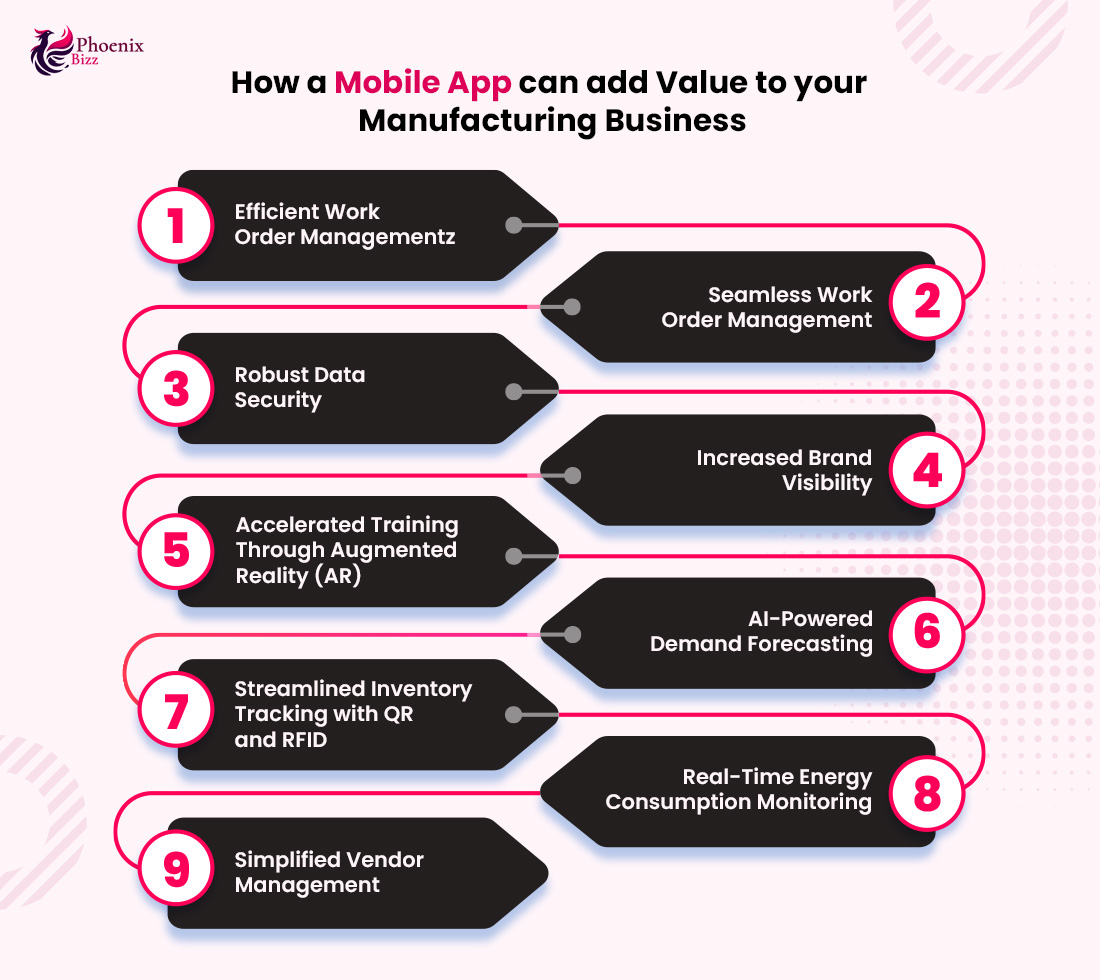
#1. Efficient Work Order Management
Manufacturing operations often involve complex, multi-phase production cycles. Relying on outdated or manual processes for managing tasks can cause workflow disruptions and project delays. A custom mobile app enables supervisors to assign and oversee work orders in real time, while allowing employees to update their status on the go. This real-time visibility fosters faster communication, improved coordination, and overall operational efficiency.
#2. Seamless Work Order Management
Manufacturing businesses typically navigate multiple stages of production, and outdated work management methods can introduce delays and inefficiencies. A custom mobile app allows supervisors to assign and oversee work orders in real time. Team members can instantly update task progress, improving communication, accelerating production timelines, and boosting overall productivity.
#3. Robust Data Security
Modern mobile apps are tailored to meet the specific needs of your business—including how your data is protected. As the business owner, you have full control over defining security protocols. Your development team can implement advanced encryption, secure user authentication, and other safeguards to ensure sensitive company information remains protected.
#4. Increased Brand Visibility
With over 7.21 billion smartphones now in use, mobile access is now normalized. A well-designed mobile app dramatically enhances your business’s reach and visibility. When potential customers search for your brand, a mobile app—or at least a mobile-optimized presence—signals credibility and professionalism, making your company more competitive and accessible to a larger audience.
#5. Accelerated Training Through Augmented Reality (AR)
Many manufacturing firms have yet to explore the full potential of augmented reality, but its benefits are substantial. AR-powered mobile apps can deliver immersive training experiences for new employees, speeding up the learning process. These apps also assist in real-time machine troubleshooting by simulating repair instructions through visual overlays.
#6. AI-Powered Demand Forecasting
Demand volatility is a recurring challenge in manufacturing. Mobile apps integrated with artificial intelligence can analyze sales patterns, seasonal shifts, and market conditions to forecast demand more accurately. This insight supports better production planning and inventory management, helping you avoid overproduction or shortages.
#7. Streamlined Inventory Tracking with QR and RFID
Manually tracking inventory is time-consuming and prone to error. A mobile app equipped with QR code scanning or RFID technology enables precise tracking of raw materials, equipment, and finished goods. This automation reduces human error, enhances inventory accuracy, and prevents costly stockouts or overstocking.
#8. Real-Time Energy Consumption Monitoring
Energy usage is a major cost center in manufacturing. A custom mobile app can track real-time energy consumption across machines and departments, flag inefficiencies, and provide actionable insights to help you lower utility expenses and optimize resource use.
#9. Simplified Vendor Management
Managing vendors through email chains and spreadsheets can be chaotic. A centralized mobile app simplifies vendor communications, streamlines order placement, and tracks invoices and payments—all in one integrated system. This leads to stronger vendor relationships and more organized operations.
What Kind of Mobile App can your Manufacturing Company Support?
When you partner with a top-tier mobile app development agency like PhoenixBizz, you’ll gain access to a variety of development options tailored to your business goals and technical needs. The three most common types of mobile applications—native apps, progressive web apps (PWAs), and hybrid apps—each come with distinct advantages, development processes, and cost structures.
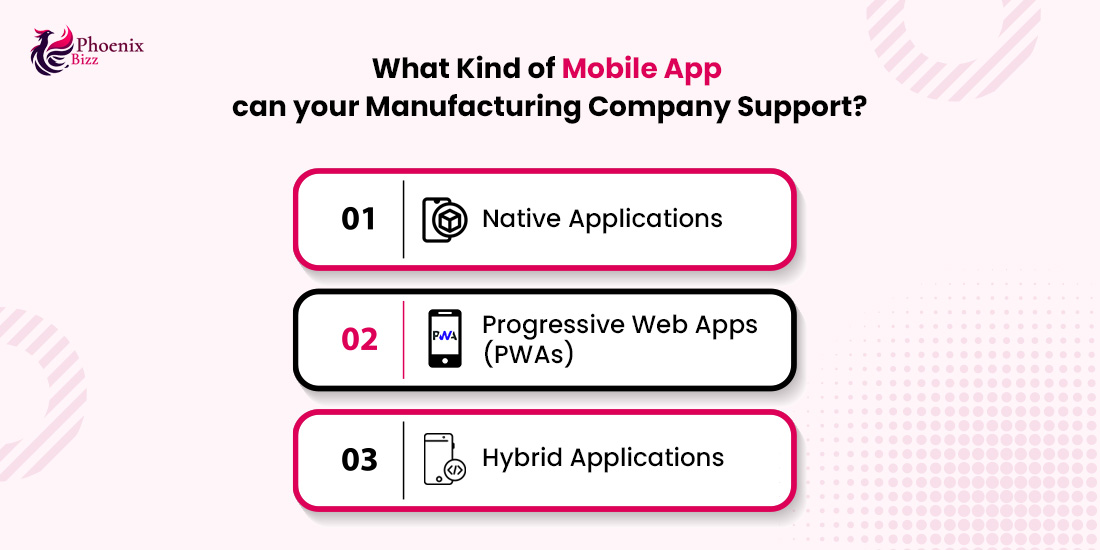
1️⃣ Native Applications
Native apps are built specifically for a single operating system—typically Android or iOS. Because these platforms require different programming languages and frameworks, developers must write and maintain separate codebases for each version. While native apps offer superior performance and seamless integration with device features, they are often more expensive and time-consuming to develop due to this platform-specific approach.
2️⃣ Progressive Web Apps (PWAs)
Progressive web apps are browser-based applications that offer many of the same features as native apps. A key advantage of PWAs is their accessibility—users can open them directly through a browser and even install them to their home screen without visiting an app store. PWAs are cost-effective, quick to deploy, and ideal for reaching users across multiple device types with minimal friction.
3️⃣ Hybrid Applications
Hybrid apps blend the strengths of native and web applications. Built using web technologies like HTML, CSS, and JavaScript, hybrid apps are wrapped in a native container, allowing them to run on multiple platforms from a single codebase. This approach reduces development time and cost while still offering access to native device features, making hybrid apps a popular choice for many businesses seeking both flexibility and broad reach.
Select the Best Mobile App Features for Your Manufacturing Business
In today’s fast-paced digital landscape, mobile apps are transforming how manufacturing businesses operate, enhancing efficiency, productivity, and internal communication. A well-designed mobile application can optimize workflows, reduce errors, and support better decision-making. Below are essential features every manufacturing company should consider integrating into their custom mobile app:
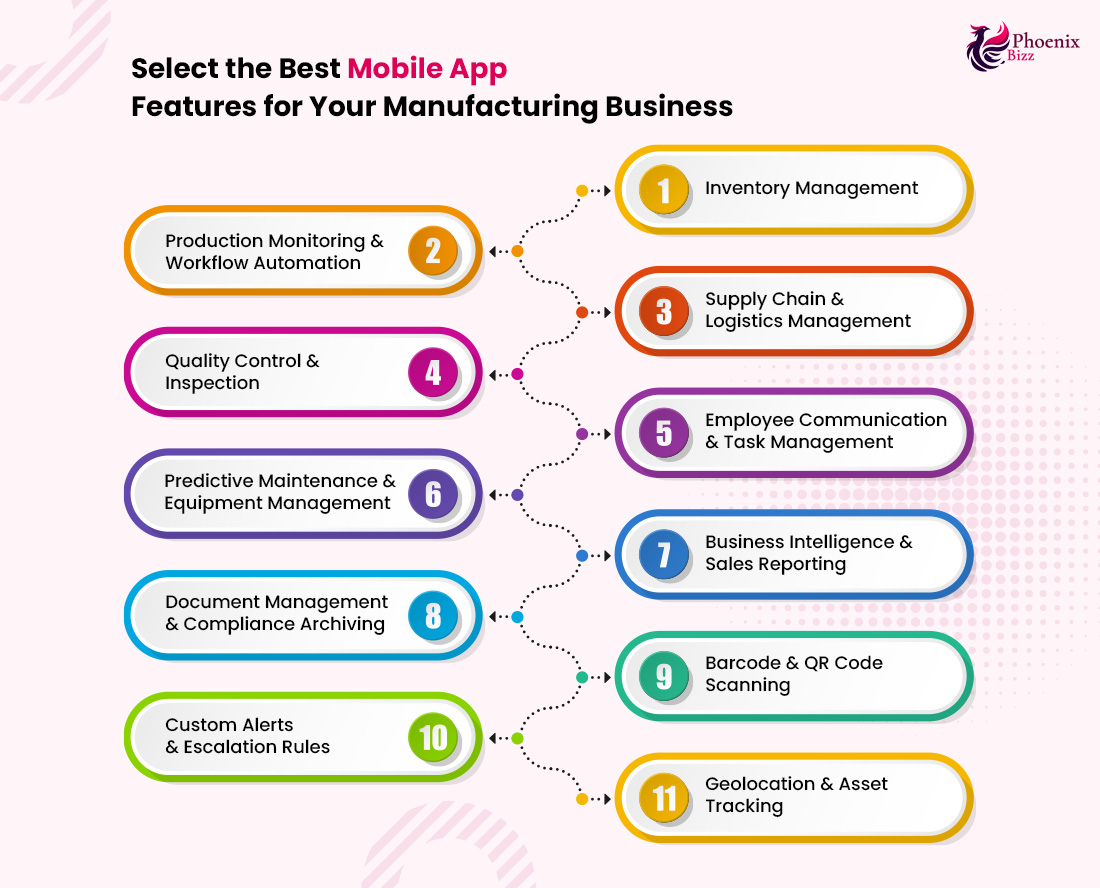
1. Inventory Management
Real-time inventory tracking enables businesses to monitor raw materials, maintain optimal stock levels, and prevent shortages. With automated updates, companies can ensure inventory accuracy, reduce waste, and minimize costly production delays.
2. Production Monitoring & Workflow Automation
Mobile apps equipped with workflow automation tools allow managers to oversee production cycles, evaluate equipment performance, and proactively reduce downtime. Real-time alerts notify supervisors of mechanical issues or process delays, helping to keep operations on track.
3. Supply Chain & Logistics Management
Effective supply chain oversight is vital in manufacturing. A mobile app can offer real-time shipment tracking, streamline communication with suppliers, and optimize logistics routes—ensuring on-time deliveries and smoother production schedules.
4. Quality Control & Inspection
In-app checklists and reporting tools allow employees to efficiently document quality control measures. AI-powered defect detection further supports product consistency and regulatory compliance. If a quality issue or compliance risk is detected, the system can instantly trigger alerts, helping the business avoid costly penalties.
5. Employee Communication & Task Management
Mobile apps keep teams connected with real-time messaging, task tracking, and instant notifications. Workers can report issues, update progress, and access onboarding or training materials—anytime, from anywhere—keeping the workforce agile and informed.
6. Predictive Maintenance & Equipment Management
Built-in predictive maintenance features allow businesses to monitor machinery health, schedule timely service, and reduce unexpected breakdowns. This not only extends the lifespan of critical equipment but also minimizes interruptions to production.
7. Business Intelligence & Sales Reporting
With built-in analytics tools, business leaders can access on-demand insights into sales performance, profit margins, and revenue trends. These features are especially useful when quick decision-making is required, even while away from a desktop or office environment.
8. Document Management & Compliance Archiving
Secure document storage within the app allows teams to upload, retrieve, and share critical documents such as safety protocols, certifications, and compliance records. Built-in version control ensures teams always work with the latest documentation and stay audit-ready.
9. Barcode & QR Code Scanning
Integrating barcode and QR code scanning capabilities allows workers to easily track components, tools, and finished products. This accelerates material handling, improves traceability, and supports real-time data collection throughout the manufacturing process.
10. Custom Alerts & Escalation Rules
Customizable notification systems ensure the right team members are alerted about time-sensitive issues such as material shortages, machine errors, or safety violations. Escalation rules can automatically route unresolved issues to higher-level management.
11. Geolocation & Asset Tracking
Geolocation services can track equipment, fleet vehicles, or raw materials in transit. This feature provides complete visibility into mobile assets, reduces theft or loss, and improves coordination between locations and suppliers.
Can Small Businesses Benefit from Owning their Own Mobile App Platform?
According to a US Bank 2024 Small Business Perspective survey, 95% of small businesses in Phoenix recognize digital tools as essential to their growth. In an increasingly competitive market, overcoming operational challenges requires strategic use of technology. Well-developed mobile apps—built with precision and expertise, allow small businesses to streamline operations and improve performance across multiple areas.
✔️ Manufacturing Talent Management
A custom talent management app helps organize and maintain detailed records of employees, staff, and factory workers. By automating administrative tasks, these apps significantly reduce the burden on HR teams, freeing up time and resources for higher-value activities.
✔️ Supply Chain & Logistics Optimization
Mobile apps built for supply chain and logistics management assist with tracking inventory levels, monitoring product quality, and maintaining delivery schedules. These tools are particularly valuable for small manufacturers that rely on consistent raw material sourcing, fleet coordination, and timely order fulfillment.
✔️ Manufacturing E-Commerce Enablement
For small manufacturing companies that provide Direct-to-Consumer (D2c) functionality, a mobile e-commerce app simplifies product listings, order processing, and payment handling. Customers can place orders instantly, turning what was once a complex process into a streamlined, efficient transaction system.
How Much Does Custom Mobile App Development Cost?
The cost of developing a custom mobile app is as varied as asking how much it costs to build a home. Mobile app development costs vary wildly depending on complexity, features, and platform requirements. Several key factors influence the costs of a project:
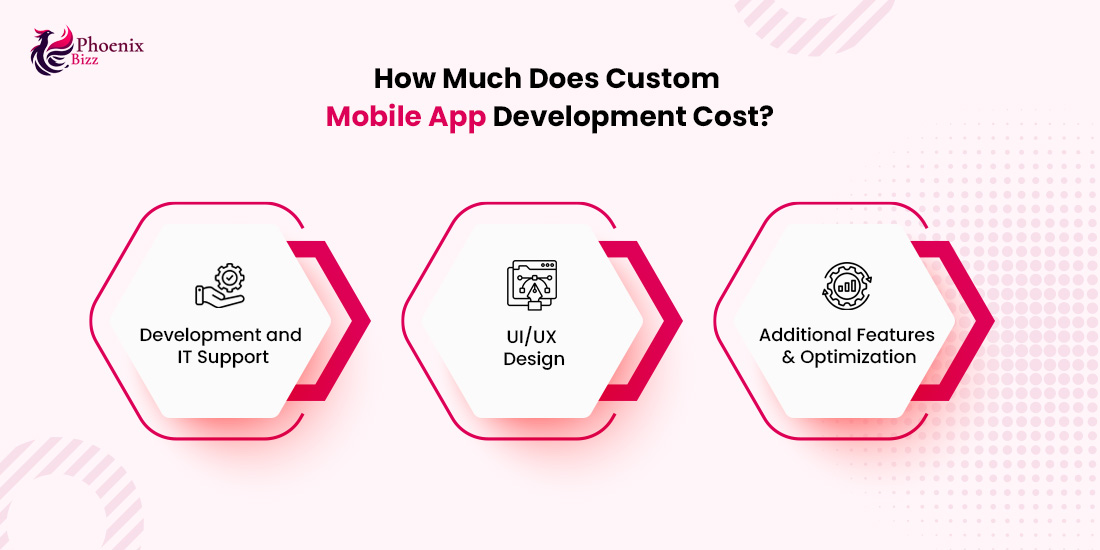
1. Development and IT Support
A substantial portion of the budget goes toward backend development and ongoing technical support. This includes coding, bug fixes, operating system updates (such as Android or iOS), routine maintenance, and performance enhancements—critical elements that ensure your app runs reliably over time.
2. UI/UX Design
An intuitive and visually appealing user interface is essential to user engagement and satisfaction. High-quality UI/UX design involves user flow mapping, wireframing, and interactive prototyping. These efforts require both creative and technical expertise, making design a significant cost factor in any mobile app development project.
3. Additional Features & Optimization
Beyond the core functionality, many businesses invest in extras such as cross-platform compatibility, advanced SEO integration, in-app analytics, push notifications, and API connections. Tailoring your app with custom features or business-specific specifications will also affect the overall price.
Wrapping Up
As mobile app adoption continues to grow rapidly, it’s no surprise that nearly half of all businesses are now exploring the development of custom mobile applications to enhance their operations. For manufacturing companies based in Phoenix, there’s good news—PhoenixBizz, one of the region’s premier mobile app development firms, is right in your backyard.
With more than two decades of experience, PhoenixBizz stands out for delivering cutting-edge, AI-driven, and user-focused mobile solutions. Our extensive technical expertise and robust development infrastructure have enabled us to serve a wide range of industries with precision-built mobile apps, PWAs, websites, and custom software—all optimized for performance, scalability, and security.
Have a project in mind? We’d love to hear about it. Reach out to our team at 623-845-2747, email us at hello@phoenixbizz.com, or visit our official website for more details.
RE: 11904
Citations:
Statista: https://www.statista.com/statistics/1489711/total-global-app-spending/
Exploding topics: https://explodingtopics.com/blog/smartphone-stats
InBusinessphx.com: https://inbusinessphx.com/economy-trends/73-of-small-businesses-have-grown-in-past-year-phoenix-based-small-business-owners-are-faring-better-than-most
